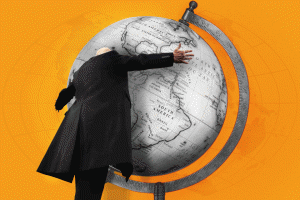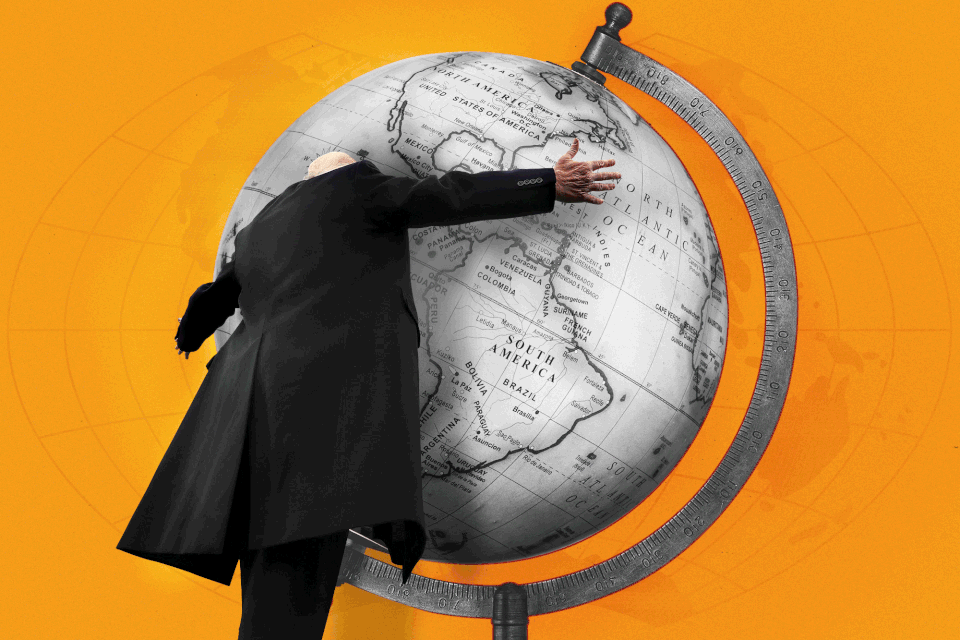 The American president, facing opposition in Europe, defends Vladimir Putin.
The American president, facing opposition in Europe, defends Vladimir Putin.

Jim Bourg / Getty / Chones / Dn Br / Shutterstock / Zak Bickel / The Atlantic
FRIEND
Israel: Israel is a longtime U.S. ally, but Barack Obama had a famously troubled relationship with Israeli Prime Minister Benjamin Netanyahu. Now Trump is aiming to restore close relations with the current Israeli government, embracing Netanyahu’s dark view of Iran and exploring whether to move the U.S. embassy from Tel Aviv to Jerusalem over the objections of Palestinians. Trump also denounced Obama for publicly opposing Israeli settlements in land that could be used for a future Palestinian state. The new U.S. administration has gently criticized Israel for accelerating settlement construction since Trump assumed the presidency, but it has also “not taken an official position on settlement activity”—a break with past American administrations.
Russia: Since the Cold War, every American president has initially tried to befriend Russia, only for the relationship to sour. That was especially true for Barack Obama, who pursued a “reset” with the Russians before eventually sanctioning them over their annexation of Crimea and interference in the U.S. presidential race. Trump, however, appears to really, really, really want to be friends with Russia, for reasons that still aren’t entirely clear. He admires Vladimir Putin as a “strong” leader and wants to partner with Russia to defeat ISIS. And he has consistently taken positions that are favorable to Russia, questioning the value of NATO, refusing to accept that Russian hackers meddled in the 2016 election (to his benefit), and suggesting that he may ease sanctions against the Kremlin. Trump’s ambassador to the United Nations has condemned Russia for seizing Crimea and not halting violence by Russian-backed separatists in eastern Ukraine. But critically, Trump himself hasn’t. Instead, he recently professed “respect” for Putin and shrugged off the allegation that the Russian president is a “killer.” The United States has “got a lot of killers,” Trump said. “Our country’s so innocent?”
United Kingdom: The “Special Relationship” remains pretty special. British Prime Minister Theresa May was the first foreign leader to visit the new American president in Washington, and Trump has applauded Britain for voting to leave the European Union. He views the anti-EU movement there as a populist campaign to restore national sovereignty, like his in the United States (you may have heard that he likes being called “Mr. Brexit”). But Trump’s travel ban on refugees and citizens of seven Muslim-majority countries is widely unpopular in Britain—to the extent that the speaker of the House of Commons has come out against Trump addressing Parliament during a future state visit to the United Kingdom, owing to the British people’s opposition to “racism” and support for “equality before the law and an independent judiciary.”
FRIEND-ISH
Australia: Relations with one of America’s most loyal allies hit a snag amid reports of a hostile call between the U.S. and Australian leaders over an Obama-era agreement for the United States to take in 1,250 refugees from detention centers off the Australian coast. The “dumb” deal, in Trump’s words, requires the U.S. to process refugees from countries included in Trump’s travel ban. But while Trump has made clear that he doesn’t agree with the pact, he may still honor it.
Japan: During the presidential campaign, Trump accused Japan of taking advantage of the United States on trade and not paying enough for the U.S. military protection that it has enjoyed since striking a defense treaty with America after World War II—prompting Japan’s prime minister to hurriedly make his way to Trump Tower after the U.S. election in search of reassurance. Japan has received that reassurance from Trump’s defense secretary, James Mattis, who visited Tokyo to affirm the U.S. government’s “100-percent” commitment to the military alliance, but not publicly from his boss in the White House.
Germany: Trump has cited German Chancellor Angela Merkel—one of Obama’s closest allies—as a leader he admires, but he’s also harshly criticized her for admitting too many refugees and dismissed the European Union as a “vehicle” for German power. Merkel, for her part, has hinted that European countries can no longer count on support from a Trump-led United States. She has also emerged as the leading defender of the liberal international system that the United States helped design after World War II; after Trump won the U.S. election, Merkel pledged cooperation based on “common values—democracy, freedom, as well as respect for the rule of law and the dignity of each and every person, regardless of their origin, skin color, creed, gender, sexual orientation, or political views.” The implication was that the American president needed a firm reminder to uphold these values.
FRENEMY
Mexico: Since the very first day of his presidential campaign, Trump has characterized Mexico as “not our friend”—a crafty country that’s stealing American jobs, clobbering the United States on trade, and sending drugs and illegal immigrants across the U.S. border. He’s promised to renegotiate NAFTA—the centerpiece of the U.S.-Mexico alliance—and made building a wall between the two friendly neighbors the most prominent part of his policy agenda. His insistence that Mexico will somehow “pay” for a border wall it doesn’t want led Mexico’s president to abruptly cancel a planned visit to the United States. The good news: The Trump administration claims the president was only kidding when he said he might send U.S. troops into Mexico to stop drug trafficking and illegal immigration
China: China’s rapid rise as a superpower has made it a rival of the United States for years now. But in his efforts to change Chinese trade practices, halt China’s military buildup in the South China Sea, and enlist China’s help in countering North Korea’s nuclear program, Trump has taken more drastic steps than past U.S. leaders. He has threatened to impose tariffs on Chinese goods, which could spark a trade war between the world’s two largest economies, and broken protocol by speaking with the leader of Taiwan, which the Chinese government considers part of China. So far, Chinese diplomats have responded to Trump with restraint. But the Chinese military has been less subtle, conducting missile tests and military drills in the first weeks of Trump’s presidency.
ENEMY
Syria, Iraq, Libya, Somalia, Sudan, and Yemen: In temporarily banning citizens of these countries plus Iran from entering the United States, and indefinitely barring Syrian refugees from the country, Trump has essentially suggested that Syrians, Iraqis, Libyans, Somalis, Sudanese, and Yemenis are all possible enemies of the state. “We must keep ‘evil’ out of our country!” Trump tweeted in justifying the policy, which he has described as a measure to block “potential terrorists and others that do not have our best interests at heart.”
North Korea: Obama reportedly advised Trump that the advance of North Korea’s nuclear-weapons program should be the top national-security priority for the new administration. Trump, who as a candidate said he’d be willing to meet directly with North Korean leader Kim Jong Un, has dismissed the notion that North Korea will soon manage to place a nuclear warhead on a long-range missile that could reach the United States. “It won’t happen!” he’s tweeted. Trump has yet to specify how he’ll make sure it doesn’t happen. There are few good options.
Iran: Obama ended a decades-old U.S. policy of isolating Iran in a bid to restrict the country’s nuclear program. Already, Trump has dramatically reversed course. While he hasn’t yet indicated that he’ll scrap the nuclear deal, he did impose sanctions on Iran and ominously put the nation “on notice” after the Iranians tested a ballistic missile. He also included Iran in his travel ban. There is wide consensus in the Trump administration—from the defense secretary to the chief political strategist to the president himself—that the Iranian government is a massive, even existential threat, the Shia version of the “radical Islam” practiced by the Sunni terrorists of ISIS. “We will have difficult days ahead,” Iran’s foreign minister recently observed, in reference to relations with the U.S. That’s likely an understatement.
https://www.theatlantic.com/international/archive/2017/02/allies-enemies-donald-trump/515439/



